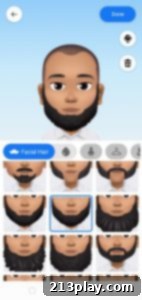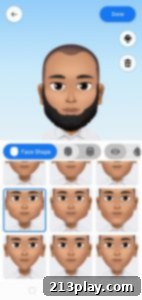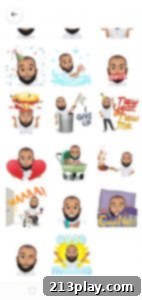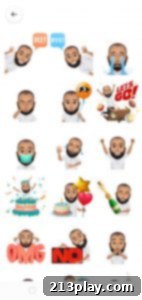Mastering Your Digital Identity: A Comprehensive Guide to Facebook Avatars
Table of Contents
Exploring the Facebook Avatar Feature
Welcome back, readers! Today, we’re diving deep into a fascinating Facebook feature that offers a unique way to express your digital self: Facebook Avatars. Announced in a Facebook post last year and officially launched in May 2020, this feature allows users to create a personalized digital representation of themselves. While it’s been around for some time, many users still haven’t fully embraced its potential or even discovered its extensive customization options. This highly engaging and entertaining tool allows you to craft a virtual likeness that can be surprisingly close to your actual appearance, or a completely imaginative persona.
More than just a simple cartoony impersonation, the Facebook Avatar feature is a versatile tool designed to enhance your online interactions. It provides a rich array of customization choices, arguably more detailed and expansive than character creation systems found in many modern video games. This level of personalization empowers users to truly make their avatar their own, reflecting their style, mood, and identity. Let’s embark on a comprehensive review of this impressive feature and uncover all it has to offer.
Creating Your Unique Facebook Avatar: A Step-by-Step Guide
Despite its rich functionality, the Facebook Avatar feature is often overlooked by users, possibly due to its somewhat inconspicuous placement within the app’s interface. To find this creative hub, navigate to the main menu. You’ll spot it conveniently located just above the “Saved” collections option. Look for a distinctive purple, emoji-like logo clearly labeled “Avatars” beneath it. While straightforward to locate, the color scheme similarity to other menu items might contribute to its reduced discoverability for some. Once you tap this icon, a brief loading screen will appear, ushering you into the avatar creation suite.
 |
 |
 |
The Facebook Avatar creator truly shines in its extensive customization capabilities. You are given a broad palette of options to craft an avatar that truly represents you, or a whimsical version of you. The level of detail is impressive, allowing for adjustments that go far beyond basic selections:
- Skin Tone: Choose from a wide spectrum of skin tones, ensuring inclusivity and accurate representation.
- Hair: Select from numerous hairstyles, lengths, and textures, along with a diverse range of hair colors to match your real hair or experiment with something new.
- Facial Features: Dive into intricate customizations for your eyes (shape, color, size), eyebrows (style, color, thickness), nose (shape, size), and mouth (lip shape, size, color). You can even refine your facial complexion with options for freckles or beauty marks.
- Facial Hair: For those who sport them, there are detailed options for mustaches, beards, and stubble, with various styles and colors.
- Body Type: Adjust your avatar’s physique to better reflect your body shape.
- Outfits and Accessories: Dress your avatar in a variety of clothing styles, from casual wear to more formal attire. You can also add head coverings, hats, glasses, and other accessories to complete your look.
 |
 |
 |
While you are working with graphic templates, Facebook has gone above and beyond to provide a robust selection that empowers users with significant creative control. This commitment to detailed customization sets Facebook Avatars apart, making the creation process enjoyable and the end result truly personalized.
 |
 |
 |
 |
 |
 |
 |
 |
 |
Unlocking the Potential: How to Use Your Facebook Avatar
Once you’ve meticulously crafted your Facebook Avatar, a world of expressive possibilities opens up within the platform. These digital doppelgängers are designed to inject personality and flair into your online interactions:
- Express Yourself in Posts and Stories: Your avatar can be integrated into your text posts with various background options, vividly showcasing your reactions or adding visual emphasis to your written words. Choose from a wide variety of poses and expressions – a cheerful “Thumbs Up,” a friendly “Saying Hi,” an enthusiastic “Stand Up Waving,” or even an animated display of anger, joy (“Hurray!”), or thoughtful contemplation. This adds a dynamic layer to your content, making your posts and stories more engaging and reflective of your current mood or message.
- Profile Picture Personalization: For those who prefer not to use a real photo, or simply want a fun alternative, your avatar can serve as a unique and personalized profile picture. It’s a creative way to represent yourself while maintaining a degree of privacy, or simply to showcase your digital persona.
- Beyond Facebook: Sharing Your Digital Self: Currently, direct integration of Facebook Avatars with other social media platforms like Instagram is not natively supported for dynamic use. However, you can easily download your avatar in various poses and reactions as static images onto your device. This workaround allows you to share your personalized avatar content across other platforms, extending its utility and reach.
 |
 |
 |
The Future of Avatars: A Glimpse into the Metaverse and VR
While Facebook Avatars are currently primarily used for social media expression, their full potential likely lies in future integration with immersive technologies. With Facebook’s rebranding to Meta and its significant investment in the metaverse, it’s highly probable that these avatars will play a pivotal role in the burgeoning world of virtual reality. Imagine a near future where your personalized avatar transcends a 2D screen to become your in-game representation:
- Virtual Communication: Instead of relying on webcams or static images, your avatar could be your real-time presence in virtual reality games or social spaces. This would enable more natural and engaging communication with friends, allowing you to interact with a digital representation that mirrors your identity.
- Emotional Mirroring: The speculation extends to avatars becoming sophisticated enough to mirror your real-time movements, gestures, and even emotional states. Picture an avatar that reacts to your joy with a digital smile, reflects your anger with a furrowed brow, or shows surprise in its virtual eyes. This level of responsiveness would create a profound sense of presence and connection in virtual environments, blurring the lines between physical and digital existence.
- A Digital Twin in the Metaverse: Ultimately, Facebook Avatars could evolve into a comprehensive “digital twin” that represents your complete existence within the metaverse. This advanced avatar would not just be a static image but a dynamic, interactive entity that embodies your persona across various virtual platforms, making your digital identity as rich and nuanced as your physical one.
This vision may seem a distant dream from the simple cartoon avatars we have today, but given the rapid advancements in technology and Meta’s ambitious goals, such developments are not just plausible but highly anticipated. Mega-corporations have a history of surprising us with groundbreaking innovations, and the evolution of Facebook Avatars into sophisticated metaverse inhabitants could very well be the next frontier.
Enhancing Conversations with Avatar Stickers
One of the most engaging aspects of Facebook Avatars is their transformation into a vast library of custom stickers. These personalized stickers offer a delightful and more expressive alternative to generic emojis, allowing you to convey emotions and quick responses in your conversations with unparalleled individuality.
You can seamlessly integrate these avatar stickers into your chats to represent a spectrum of reactions – from pure joy to thoughtful contemplation. They are perfect for delivering quick, one or two-word answers like “Yes,” “No,” “Hi,” or “Buy,” effectively streamlining communication and adding a touch of personality. In some cases, a small conversation can even be conducted solely through the nuanced expressions of your avatar stickers.
 |
 |
 |
The variety of these stickers is truly impressive, encompassing a wide range of common phrases and sentiments: “Happy New Year,” “It’s too cold,” “I’ve got this,” “Happy Birthday,” “Congrats,” “Bring it on,” “Hugs,” “Miss you,” and countless others. The sheer volume and diversity of these avatar-based stickers are arguably one of the most compelling aspects of the entire feature, empowering users with an extensive visual vocabulary.
While, as previously mentioned, direct cross-platform integration for dynamic avatar usage is not yet widespread, the versatility of these personalized expressions makes it almost inevitable that Meta will extend this feature. We anticipate seeing these avatars and their sticker counterparts seamlessly integrated into other Meta-owned platforms like Instagram and WhatsApp, and most significantly, into the Oculus Rift ecosystem. This strategic expansion would leverage the avatar’s potential across a broader range of digital interactions, fulfilling Meta’s vision for a unified, immersive digital experience.
Facebook Avatars and Data: A Broader Perspective
It’s important to approach any new feature from a major tech company with a critical eye, especially when it involves personal customization and digital identity. As with many aspects of Facebook’s ecosystem, the introduction of the Avatar feature inevitably raises questions about data collection and privacy. Some might argue that this initiative, while seemingly innocuous and fun, could also serve as a sophisticated mechanism for collecting valuable user data. It wouldn’t be surprising if Meta (formerly Facebook) were in a developmental phase for something much larger, with the Avatar feature acting as a data-gathering tool.
Facebook has, in the past, faced scrutiny and accusations regarding privacy violations and the collection of user data without explicit or fully transparent consent. In this context, it’s a valid consideration that the granular customization options within the Avatar creator – choices about facial features, skin tone, hair, body type, and clothing preferences – could be invaluable for training advanced AI models. This data could help Meta refine its avatar technology, enhance facial recognition algorithms, and better understand global user demographics and aesthetic preferences, all of which are crucial for building a truly immersive and personalized metaverse experience for the Oculus Rift and future VR platforms.
How would such a grand feature, a fully customized and responsive avatar in a virtual world, be developed? It would undoubtedly require an enormous amount of diverse and detailed user data. And how does Meta acquire this data? Through its billions of users, like you and me, who frequently agree to privacy policies with varying degrees of awareness about the implications for their personal data. If Facebook indeed collects our data through the avatar feature to fuel its future projects, it underscores the ongoing “social contract” users have with these platforms. While the desire for personalization and connection online is strong, users must remain vigilant about the data they share and understand the potential uses of this information. To mitigate concerns, users can always choose to limit their engagement with such features or, for a more drastic measure, consider reducing their overall usage of platforms that heavily rely on data collection. However, as many know, avoiding data collection entirely in the digital age is a significant challenge, with numerous companies continuously gathering information.
Final Thoughts: Embracing Your Digital Persona
In conclusion, the Facebook Avatar feature is far more than just a playful gimmick; it’s a dynamic tool for digital self-expression that offers immense potential. Its current capabilities provide users with a fun, versatile, and highly customizable way to interact and personalize their presence on Facebook, making posts, stories, and conversations more engaging and uniquely ‘them.’
Looking ahead, the integration of these avatars into Meta’s broader metaverse vision, particularly with platforms like Oculus Rift, promises a truly transformative experience. As technology progresses, our digital personas are set to become increasingly sophisticated, capable of mirroring our real-world identities and emotions within immersive virtual environments. This evolution underscores the growing importance of digital identity and the creative ways we can represent ourselves online.
We hope you’ve enjoyed this in-depth exploration of Facebook Avatars and their exciting future. Please continue to visit our blog for more insights and reviews; we publish weekly. You might also find our Smartphone app Reviews or Latest Gadget Reviews equally engaging. We look forward to seeing you again next week!
